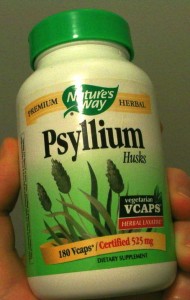A recent minor spat between the University of Iowa & the University of Melbourne brings awareness to the roles that prunes, sorbitol & FODMAPs play in Irritable Bowel Syndrome.
Prunes were the topic of discussion in a recent debate over their effectiveness in treating Irritable Bowel Syndrome constipation. The debate started over a bit of research done by the University of Iowa’s Department of Gastroenterology which suggested that prunes were possibly a more effective treatment option than psyllium husks for those with Irritable Bowel Syndrome constipation. Continue reading “Irritable Bowel Syndrome & The Great Prune Debate” »
Today we’re taking a look at Nature’s Way Psyllium Husks capsules.
 Psyllium husks come from the seeds of the psyllium plant. Psyllium husks are hydrophilic meaning they are attracted to water & readily absorb it. When saturated with water psyllium husks produce mucilage which is a thick gooey substance. Mucilage creates a film over mucous membranes, such as those found in the intestines. This film can help with the passage of stool as well as lowering inflammation by reducing the chances of irritation.
Psyllium husks come from the seeds of the psyllium plant. Psyllium husks are hydrophilic meaning they are attracted to water & readily absorb it. When saturated with water psyllium husks produce mucilage which is a thick gooey substance. Mucilage creates a film over mucous membranes, such as those found in the intestines. This film can help with the passage of stool as well as lowering inflammation by reducing the chances of irritation.
Psyllium husk is not digestible so it can be thought of as a “bulking agent”, meaning it will help add size to stool potentially increasing the chances of properly formed stool, which can aid with proper bowel movements.Psyllium husk is often advertised as a laxative, but it’s not a stimulant & can be used on a daily basis for those who want to try adding fiber to their their daily diet or treatment regimen. Fiber supplementation can be helpful for things like chronic diarrhea or constipation related to Irritable Bowel Syndrome or Inflammatory Bowel Diseases like Crohn’s Disease or Ulcerative Colitis. Continue reading “Review: Nature’s Way Psyllium Husks” »
